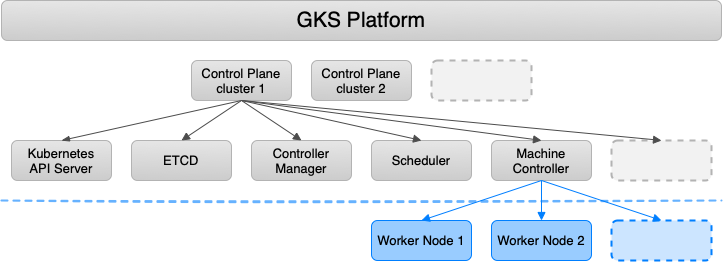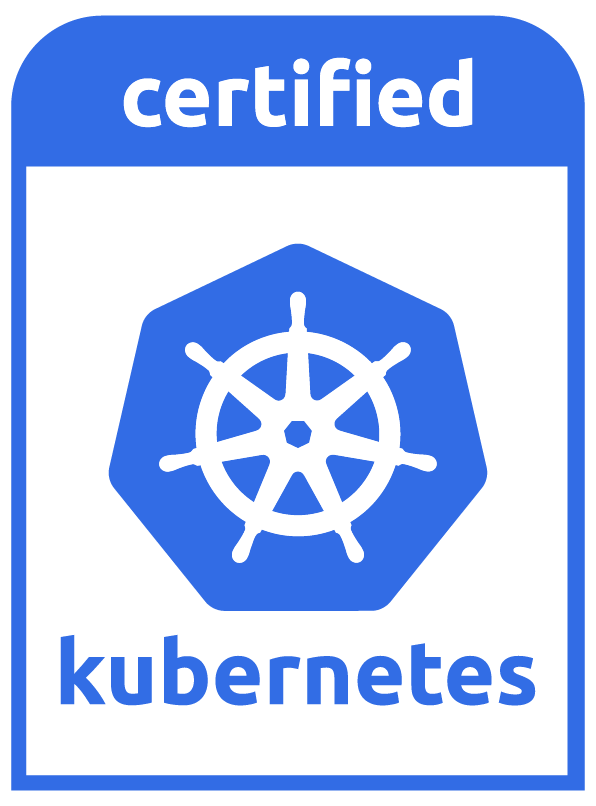About GKS
What Is the GKS Platform?
The GKS platform offers Managed Kubernetes Clusters. As a customer, you can create, update, and delete managed Kubernetes clusters with just a simple click in our web interface.
What Is a Managed Kubernetes Cluster?
Kubernetes clusters in general provide a reliable and scalable environment to run containerized applications.
With a managed Kubernetes cluster on our GKS platform, we:
- Take care of the underlying infrastructure and the Kubernetes installation
- Ensure scalability and provide you the option to configure the amount and size of your worker nodes for your needs
- Completely manage the control plane for you
While we ensure that the cluster itself is up and running, you have full access to the cluster with a kubeconfig-file. You have control over your clusters all time.
You can:
- Easily create and manage an unlimited amount of Kubernetes clusters with our web interface.
- Even upgrade the Kubernetes version of existing clusters with just a click.
- Instantly delete clusters that are not needed anymore.
- Have full SSH-root access to your worker nodes, if needed (for example, for debugging your own applications).
In case anything goes wrong, you can reach out to our 24/7 support or, as an optional service, schedule a session with our Professional Services team to deep-dive and discuss your technical questions and architecture.
How Can I Use a Managed Kubernetes Cluster?
Of course you can use the GKS clusters like any Kubernetes cluster - just with the GKS platform, you can focus on your application instead of having to care about the underlying infrastructure.
For example, you can install a pre-packaged containerized application with helm, such as:
Besides pre-packaged and ready-to-use applications, Kubernetes is also the natural environment to develop, build, and run your own, state-of-the-art “cloud-native” applications.
For a development-environment, you can install the following apps to a Kubernetes cluster:
- gitlab to manage your sourcecode
- Jenkins to automate your workflows
- Artifactory to store your build results in
Then you may create dev, staging, and production Kubernetes clusters with the GKS platform and use easy-to-install, existing components to support your application architecture, such as a:
- Complete Kafka setup
- PostgreSQL-, MySQL- or MariaDB-database
- Full-featured Prometheus-Monitoring-Stack incl. Prometheus, Alertmanager, and Grafana
These are just examples. If you want to deep dive and get consulting on how to best build your app on Kubernetes, schedule a session with our Professional Services team.
How Does the GKS Platform Work?
The GKS platform itself is based on Kubernetes as well. Internally, GKS runs the control plane of a customer cluster in a dedicated Kubernetes namespace with all required workloads running as deployments inside this namespace:
- Kubernetes API server
- Etcd database
- Controller-manager
- Scheduler
- Machine-controller
- Other workloads
Running the control plane in Kubernetes has many advantages for management, such as automated scheduling as well as scaling and self-healing capabilities.

The worker nodes of a customer cluster are dedicated VMs in the Openstack tenant of a customer. The machine-controller automatically creates VMs there and adds them as worker nodes to the cluster. It scales the number of nodes up or down as required and performs any changes to a machine deployment as a rolling upgrade to minimize downtime.
Certifications

GKS is a product to efficiently set up and operate Kubernetes clusters on GEC Cloud. Customers have the option to use a powerful web interface to deploy and manage completely functional clusters that also pass the conformance checks and requirements by the Cloud Native Computing Foundation.
Conformance results of our platform can be validated and checked at CNCF Kubernetes Conformance


